ACC305 Audit and Ethics: Analyzing Breaches of APES 110 Standard
VerifiedAdded on 2023/06/14
|11
|2003
|281
Homework Assignment
AI Summary
This assignment focuses on the ethical requirements of APES 110 within the context of auditing and professional practice. It identifies and analyzes various scenarios to determine whether they constitute a breach of APES 110, specifying the breached ethical principle in each case, covering issues like confidentiality, objectivity, and professional behavior. The assignment also addresses the types of audit opinions (unqualified, qualified, disclaimer, and adverse) and provides scenarios where each type of opinion would be appropriate based on the auditor's findings and limitations encountered during the audit process. It covers aspects such as restrictions on verification, departures from GAAP, and doubts about the company's going concern status. Desklib offers this assignment as a resource, providing students with access to solved assignments and past papers.
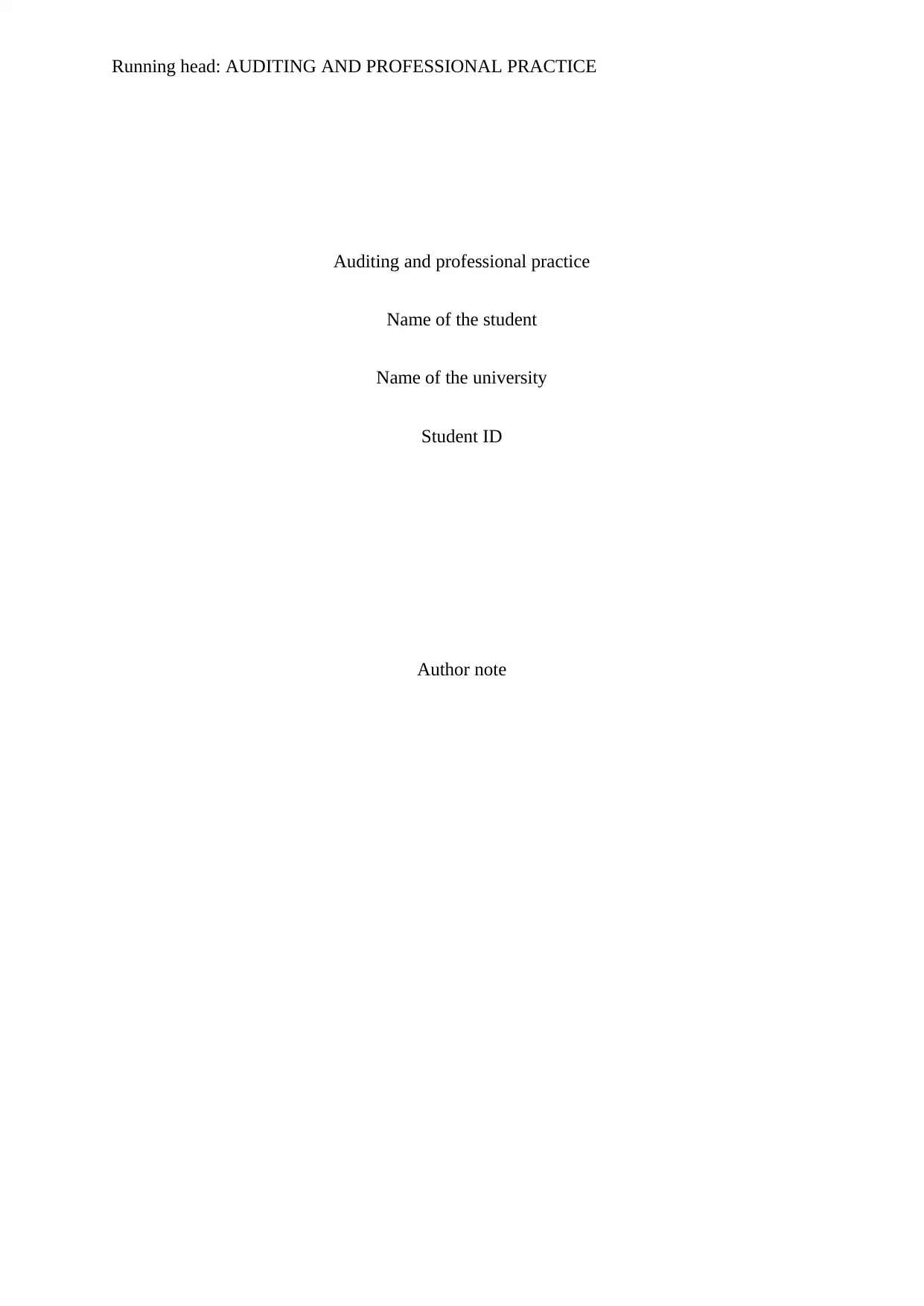
Running head: AUDITING AND PROFESSIONAL PRACTICE
Auditing and professional practice
Name of the student
Name of the university
Student ID
Author note
Auditing and professional practice
Name of the student
Name of the university
Student ID
Author note
Paraphrase This Document
Need a fresh take? Get an instant paraphrase of this document with our AI Paraphraser
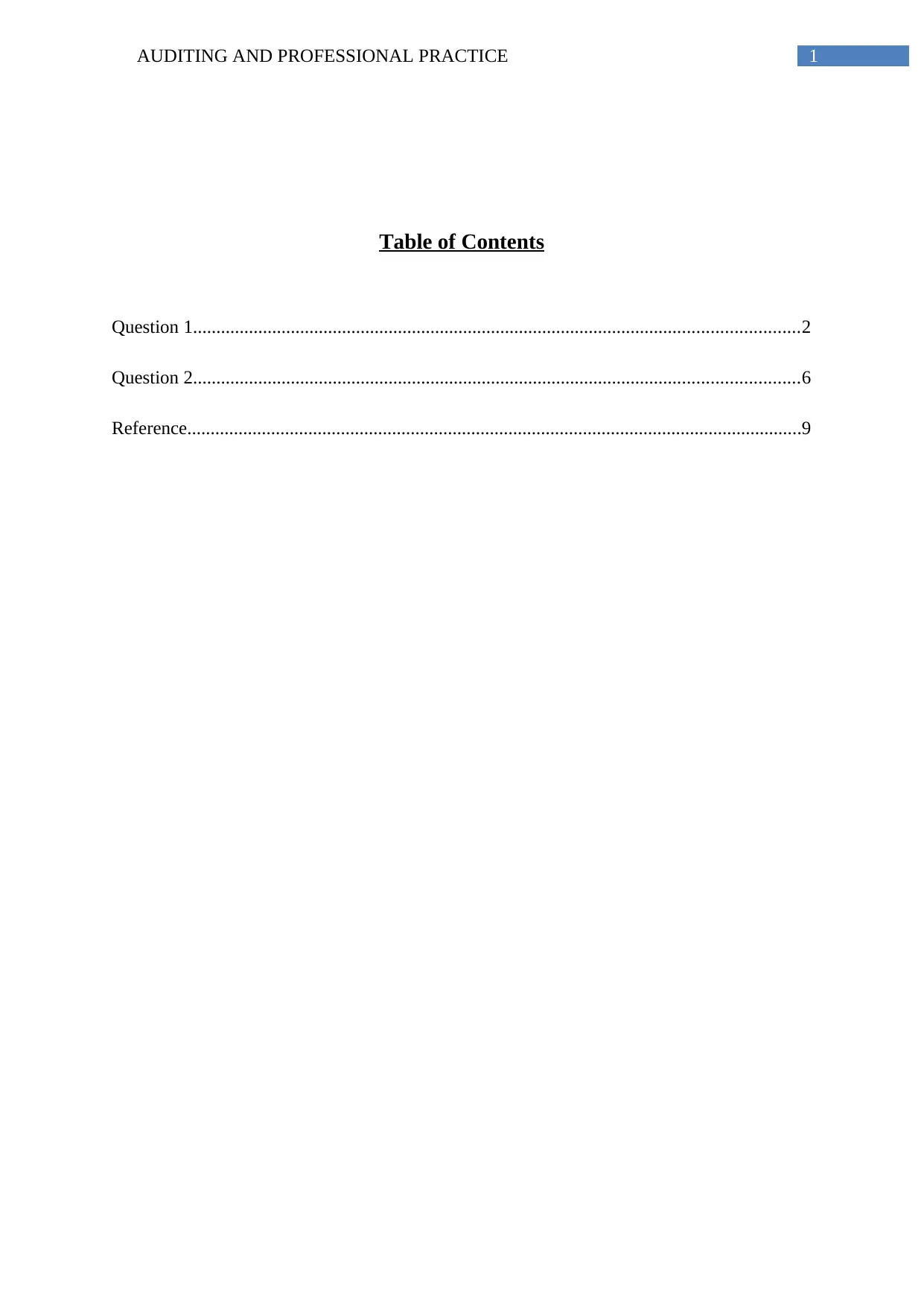
1AUDITING AND PROFESSIONAL PRACTICE
Table of Contents
Question 1..................................................................................................................................2
Question 2..................................................................................................................................6
Reference....................................................................................................................................9
Table of Contents
Question 1..................................................................................................................................2
Question 2..................................................................................................................................6
Reference....................................................................................................................................9
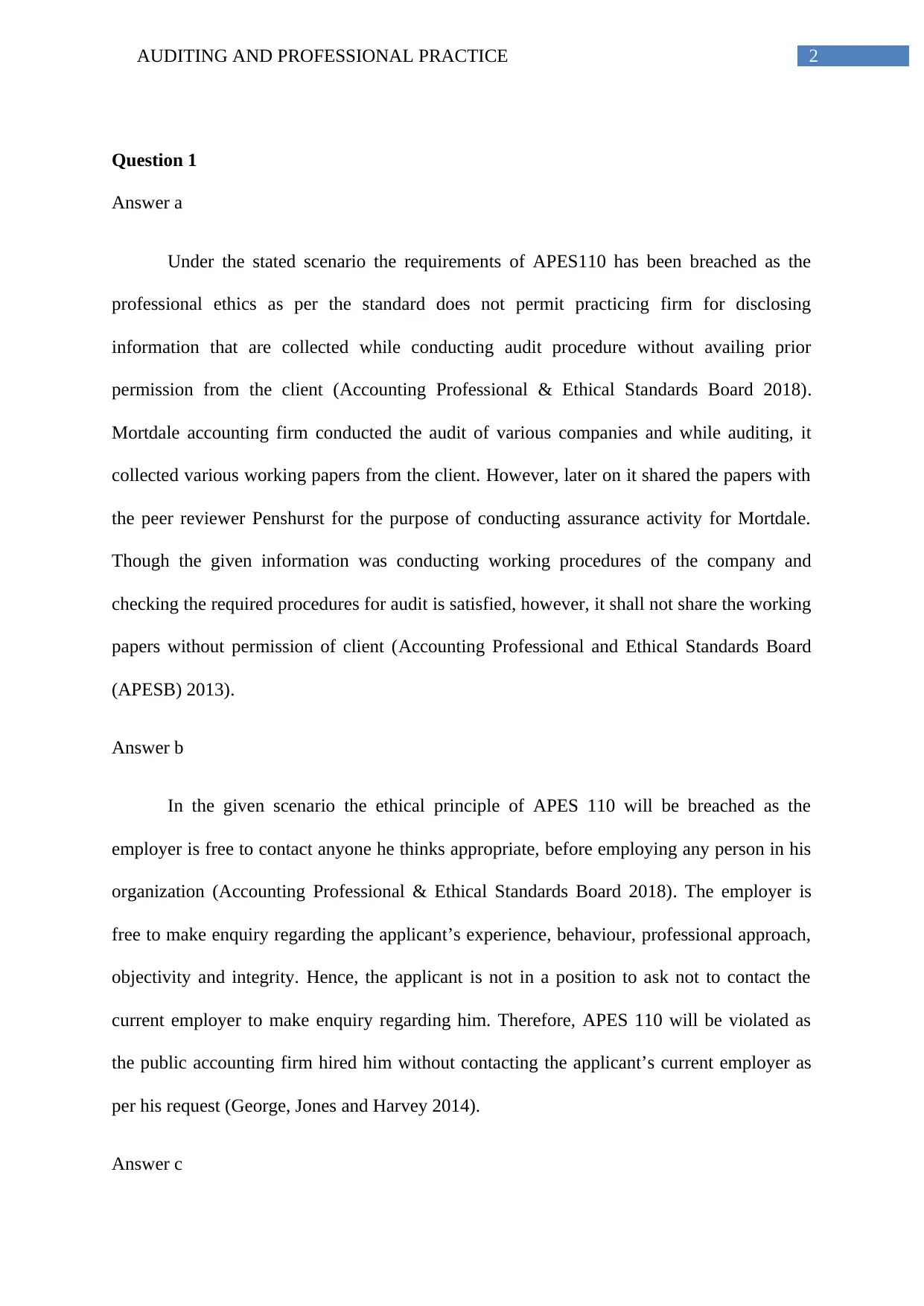
2AUDITING AND PROFESSIONAL PRACTICE
Question 1
Answer a
Under the stated scenario the requirements of APES110 has been breached as the
professional ethics as per the standard does not permit practicing firm for disclosing
information that are collected while conducting audit procedure without availing prior
permission from the client (Accounting Professional & Ethical Standards Board 2018).
Mortdale accounting firm conducted the audit of various companies and while auditing, it
collected various working papers from the client. However, later on it shared the papers with
the peer reviewer Penshurst for the purpose of conducting assurance activity for Mortdale.
Though the given information was conducting working procedures of the company and
checking the required procedures for audit is satisfied, however, it shall not share the working
papers without permission of client (Accounting Professional and Ethical Standards Board
(APESB) 2013).
Answer b
In the given scenario the ethical principle of APES 110 will be breached as the
employer is free to contact anyone he thinks appropriate, before employing any person in his
organization (Accounting Professional & Ethical Standards Board 2018). The employer is
free to make enquiry regarding the applicant’s experience, behaviour, professional approach,
objectivity and integrity. Hence, the applicant is not in a position to ask not to contact the
current employer to make enquiry regarding him. Therefore, APES 110 will be violated as
the public accounting firm hired him without contacting the applicant’s current employer as
per his request (George, Jones and Harvey 2014).
Answer c
Question 1
Answer a
Under the stated scenario the requirements of APES110 has been breached as the
professional ethics as per the standard does not permit practicing firm for disclosing
information that are collected while conducting audit procedure without availing prior
permission from the client (Accounting Professional & Ethical Standards Board 2018).
Mortdale accounting firm conducted the audit of various companies and while auditing, it
collected various working papers from the client. However, later on it shared the papers with
the peer reviewer Penshurst for the purpose of conducting assurance activity for Mortdale.
Though the given information was conducting working procedures of the company and
checking the required procedures for audit is satisfied, however, it shall not share the working
papers without permission of client (Accounting Professional and Ethical Standards Board
(APESB) 2013).
Answer b
In the given scenario the ethical principle of APES 110 will be breached as the
employer is free to contact anyone he thinks appropriate, before employing any person in his
organization (Accounting Professional & Ethical Standards Board 2018). The employer is
free to make enquiry regarding the applicant’s experience, behaviour, professional approach,
objectivity and integrity. Hence, the applicant is not in a position to ask not to contact the
current employer to make enquiry regarding him. Therefore, APES 110 will be violated as
the public accounting firm hired him without contacting the applicant’s current employer as
per his request (George, Jones and Harvey 2014).
Answer c
⊘ This is a preview!⊘
Do you want full access?
Subscribe today to unlock all pages.

Trusted by 1+ million students worldwide
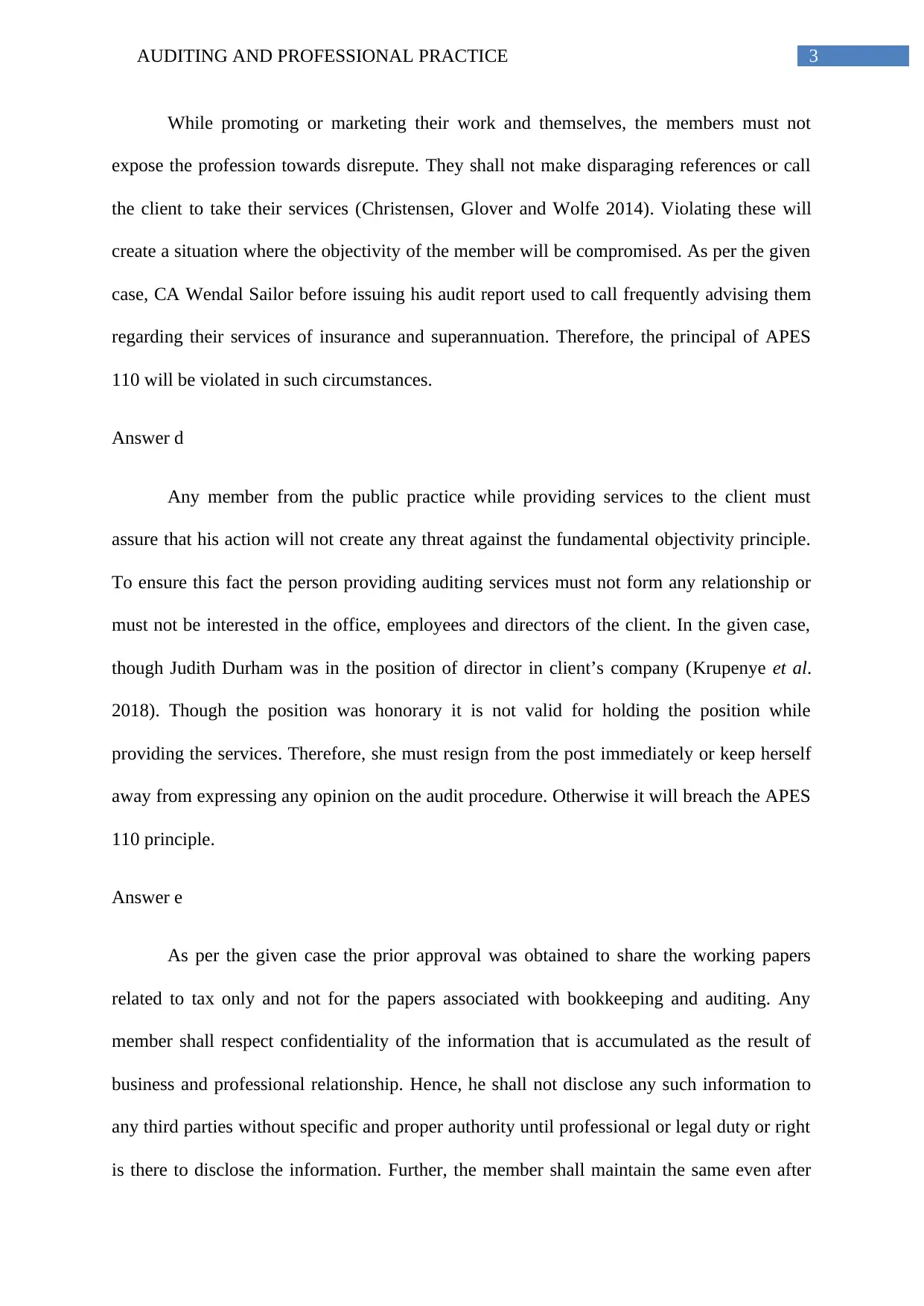
3AUDITING AND PROFESSIONAL PRACTICE
While promoting or marketing their work and themselves, the members must not
expose the profession towards disrepute. They shall not make disparaging references or call
the client to take their services (Christensen, Glover and Wolfe 2014). Violating these will
create a situation where the objectivity of the member will be compromised. As per the given
case, CA Wendal Sailor before issuing his audit report used to call frequently advising them
regarding their services of insurance and superannuation. Therefore, the principal of APES
110 will be violated in such circumstances.
Answer d
Any member from the public practice while providing services to the client must
assure that his action will not create any threat against the fundamental objectivity principle.
To ensure this fact the person providing auditing services must not form any relationship or
must not be interested in the office, employees and directors of the client. In the given case,
though Judith Durham was in the position of director in client’s company (Krupenye et al.
2018). Though the position was honorary it is not valid for holding the position while
providing the services. Therefore, she must resign from the post immediately or keep herself
away from expressing any opinion on the audit procedure. Otherwise it will breach the APES
110 principle.
Answer e
As per the given case the prior approval was obtained to share the working papers
related to tax only and not for the papers associated with bookkeeping and auditing. Any
member shall respect confidentiality of the information that is accumulated as the result of
business and professional relationship. Hence, he shall not disclose any such information to
any third parties without specific and proper authority until professional or legal duty or right
is there to disclose the information. Further, the member shall maintain the same even after
While promoting or marketing their work and themselves, the members must not
expose the profession towards disrepute. They shall not make disparaging references or call
the client to take their services (Christensen, Glover and Wolfe 2014). Violating these will
create a situation where the objectivity of the member will be compromised. As per the given
case, CA Wendal Sailor before issuing his audit report used to call frequently advising them
regarding their services of insurance and superannuation. Therefore, the principal of APES
110 will be violated in such circumstances.
Answer d
Any member from the public practice while providing services to the client must
assure that his action will not create any threat against the fundamental objectivity principle.
To ensure this fact the person providing auditing services must not form any relationship or
must not be interested in the office, employees and directors of the client. In the given case,
though Judith Durham was in the position of director in client’s company (Krupenye et al.
2018). Though the position was honorary it is not valid for holding the position while
providing the services. Therefore, she must resign from the post immediately or keep herself
away from expressing any opinion on the audit procedure. Otherwise it will breach the APES
110 principle.
Answer e
As per the given case the prior approval was obtained to share the working papers
related to tax only and not for the papers associated with bookkeeping and auditing. Any
member shall respect confidentiality of the information that is accumulated as the result of
business and professional relationship. Hence, he shall not disclose any such information to
any third parties without specific and proper authority until professional or legal duty or right
is there to disclose the information. Further, the member shall maintain the same even after
Paraphrase This Document
Need a fresh take? Get an instant paraphrase of this document with our AI Paraphraser
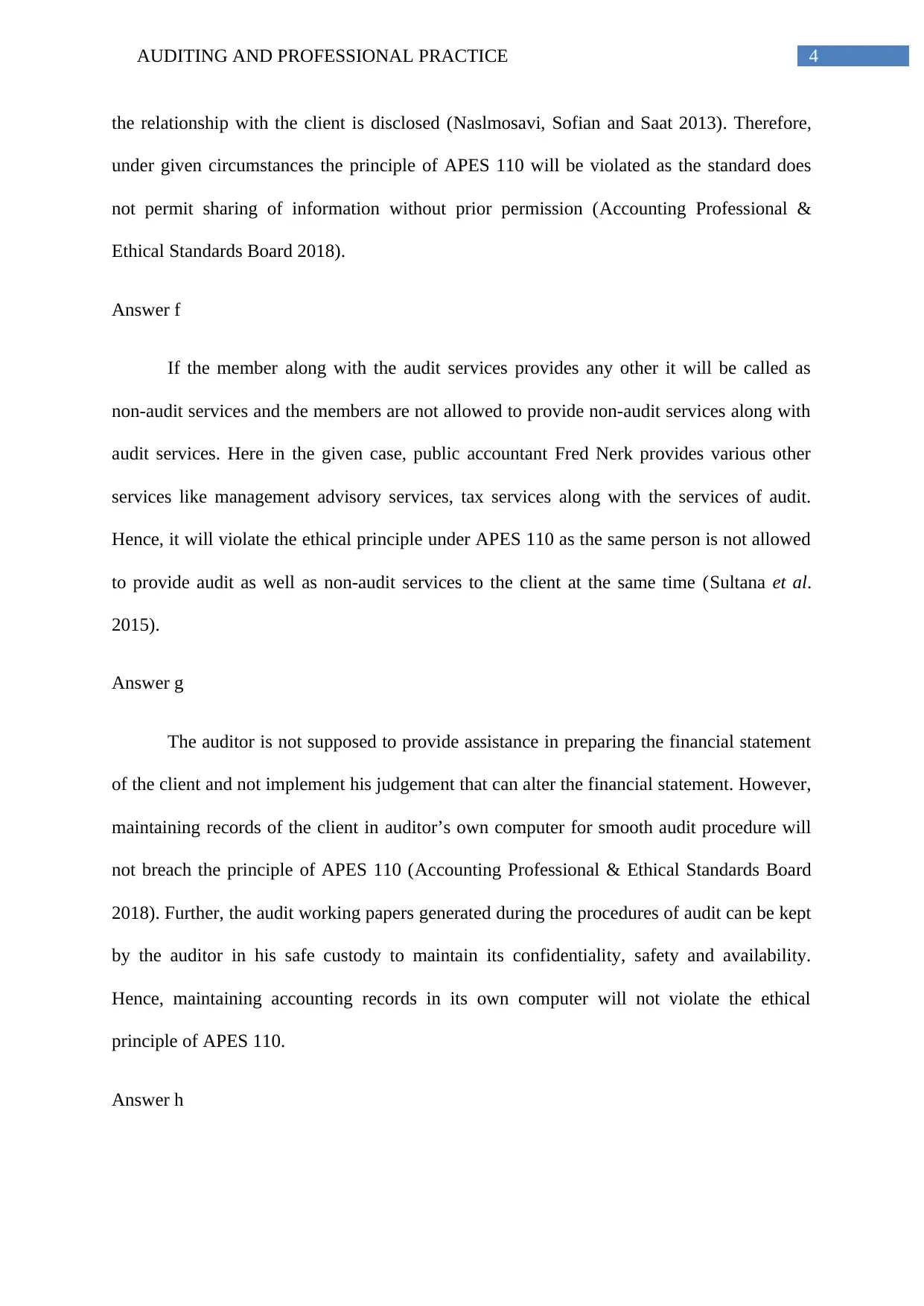
4AUDITING AND PROFESSIONAL PRACTICE
the relationship with the client is disclosed (Naslmosavi, Sofian and Saat 2013). Therefore,
under given circumstances the principle of APES 110 will be violated as the standard does
not permit sharing of information without prior permission (Accounting Professional &
Ethical Standards Board 2018).
Answer f
If the member along with the audit services provides any other it will be called as
non-audit services and the members are not allowed to provide non-audit services along with
audit services. Here in the given case, public accountant Fred Nerk provides various other
services like management advisory services, tax services along with the services of audit.
Hence, it will violate the ethical principle under APES 110 as the same person is not allowed
to provide audit as well as non-audit services to the client at the same time (Sultana et al.
2015).
Answer g
The auditor is not supposed to provide assistance in preparing the financial statement
of the client and not implement his judgement that can alter the financial statement. However,
maintaining records of the client in auditor’s own computer for smooth audit procedure will
not breach the principle of APES 110 (Accounting Professional & Ethical Standards Board
2018). Further, the audit working papers generated during the procedures of audit can be kept
by the auditor in his safe custody to maintain its confidentiality, safety and availability.
Hence, maintaining accounting records in its own computer will not violate the ethical
principle of APES 110.
Answer h
the relationship with the client is disclosed (Naslmosavi, Sofian and Saat 2013). Therefore,
under given circumstances the principle of APES 110 will be violated as the standard does
not permit sharing of information without prior permission (Accounting Professional &
Ethical Standards Board 2018).
Answer f
If the member along with the audit services provides any other it will be called as
non-audit services and the members are not allowed to provide non-audit services along with
audit services. Here in the given case, public accountant Fred Nerk provides various other
services like management advisory services, tax services along with the services of audit.
Hence, it will violate the ethical principle under APES 110 as the same person is not allowed
to provide audit as well as non-audit services to the client at the same time (Sultana et al.
2015).
Answer g
The auditor is not supposed to provide assistance in preparing the financial statement
of the client and not implement his judgement that can alter the financial statement. However,
maintaining records of the client in auditor’s own computer for smooth audit procedure will
not breach the principle of APES 110 (Accounting Professional & Ethical Standards Board
2018). Further, the audit working papers generated during the procedures of audit can be kept
by the auditor in his safe custody to maintain its confidentiality, safety and availability.
Hence, maintaining accounting records in its own computer will not violate the ethical
principle of APES 110.
Answer h
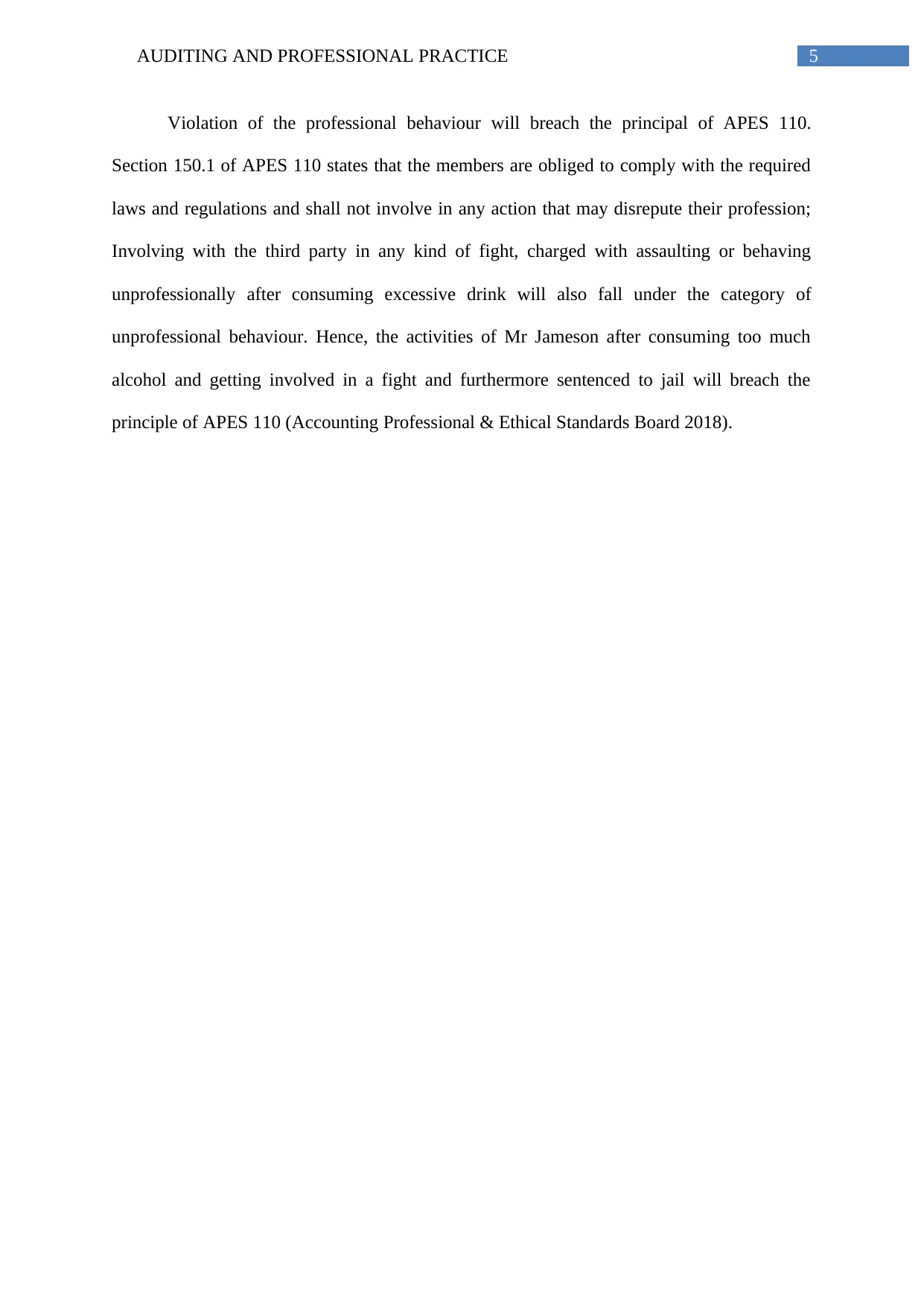
5AUDITING AND PROFESSIONAL PRACTICE
Violation of the professional behaviour will breach the principal of APES 110.
Section 150.1 of APES 110 states that the members are obliged to comply with the required
laws and regulations and shall not involve in any action that may disrepute their profession;
Involving with the third party in any kind of fight, charged with assaulting or behaving
unprofessionally after consuming excessive drink will also fall under the category of
unprofessional behaviour. Hence, the activities of Mr Jameson after consuming too much
alcohol and getting involved in a fight and furthermore sentenced to jail will breach the
principle of APES 110 (Accounting Professional & Ethical Standards Board 2018).
Violation of the professional behaviour will breach the principal of APES 110.
Section 150.1 of APES 110 states that the members are obliged to comply with the required
laws and regulations and shall not involve in any action that may disrepute their profession;
Involving with the third party in any kind of fight, charged with assaulting or behaving
unprofessionally after consuming excessive drink will also fall under the category of
unprofessional behaviour. Hence, the activities of Mr Jameson after consuming too much
alcohol and getting involved in a fight and furthermore sentenced to jail will breach the
principle of APES 110 (Accounting Professional & Ethical Standards Board 2018).
⊘ This is a preview!⊘
Do you want full access?
Subscribe today to unlock all pages.

Trusted by 1+ million students worldwide
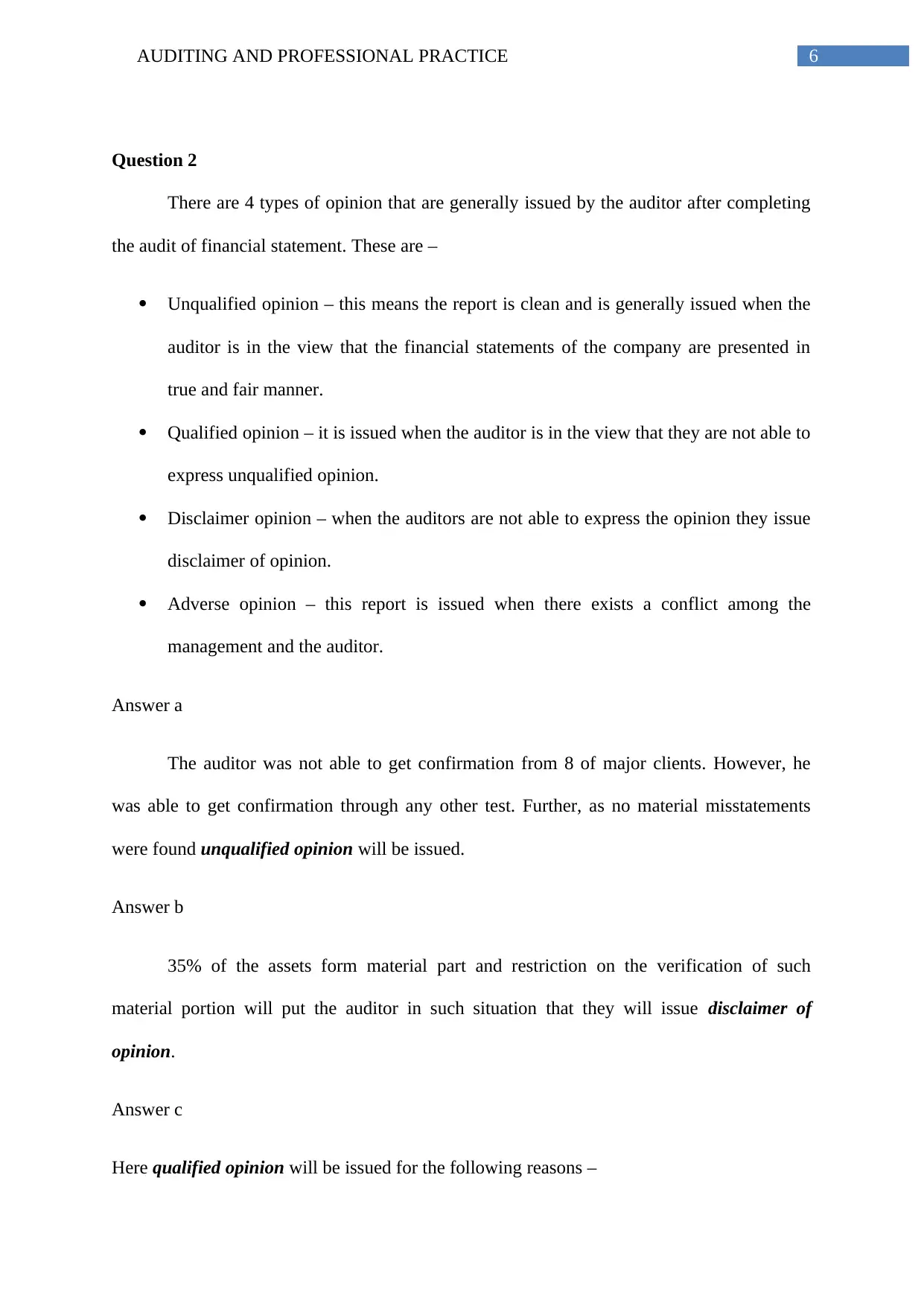
6AUDITING AND PROFESSIONAL PRACTICE
Question 2
There are 4 types of opinion that are generally issued by the auditor after completing
the audit of financial statement. These are –
Unqualified opinion – this means the report is clean and is generally issued when the
auditor is in the view that the financial statements of the company are presented in
true and fair manner.
Qualified opinion – it is issued when the auditor is in the view that they are not able to
express unqualified opinion.
Disclaimer opinion – when the auditors are not able to express the opinion they issue
disclaimer of opinion.
Adverse opinion – this report is issued when there exists a conflict among the
management and the auditor.
Answer a
The auditor was not able to get confirmation from 8 of major clients. However, he
was able to get confirmation through any other test. Further, as no material misstatements
were found unqualified opinion will be issued.
Answer b
35% of the assets form material part and restriction on the verification of such
material portion will put the auditor in such situation that they will issue disclaimer of
opinion.
Answer c
Here qualified opinion will be issued for the following reasons –
Question 2
There are 4 types of opinion that are generally issued by the auditor after completing
the audit of financial statement. These are –
Unqualified opinion – this means the report is clean and is generally issued when the
auditor is in the view that the financial statements of the company are presented in
true and fair manner.
Qualified opinion – it is issued when the auditor is in the view that they are not able to
express unqualified opinion.
Disclaimer opinion – when the auditors are not able to express the opinion they issue
disclaimer of opinion.
Adverse opinion – this report is issued when there exists a conflict among the
management and the auditor.
Answer a
The auditor was not able to get confirmation from 8 of major clients. However, he
was able to get confirmation through any other test. Further, as no material misstatements
were found unqualified opinion will be issued.
Answer b
35% of the assets form material part and restriction on the verification of such
material portion will put the auditor in such situation that they will issue disclaimer of
opinion.
Answer c
Here qualified opinion will be issued for the following reasons –
Paraphrase This Document
Need a fresh take? Get an instant paraphrase of this document with our AI Paraphraser
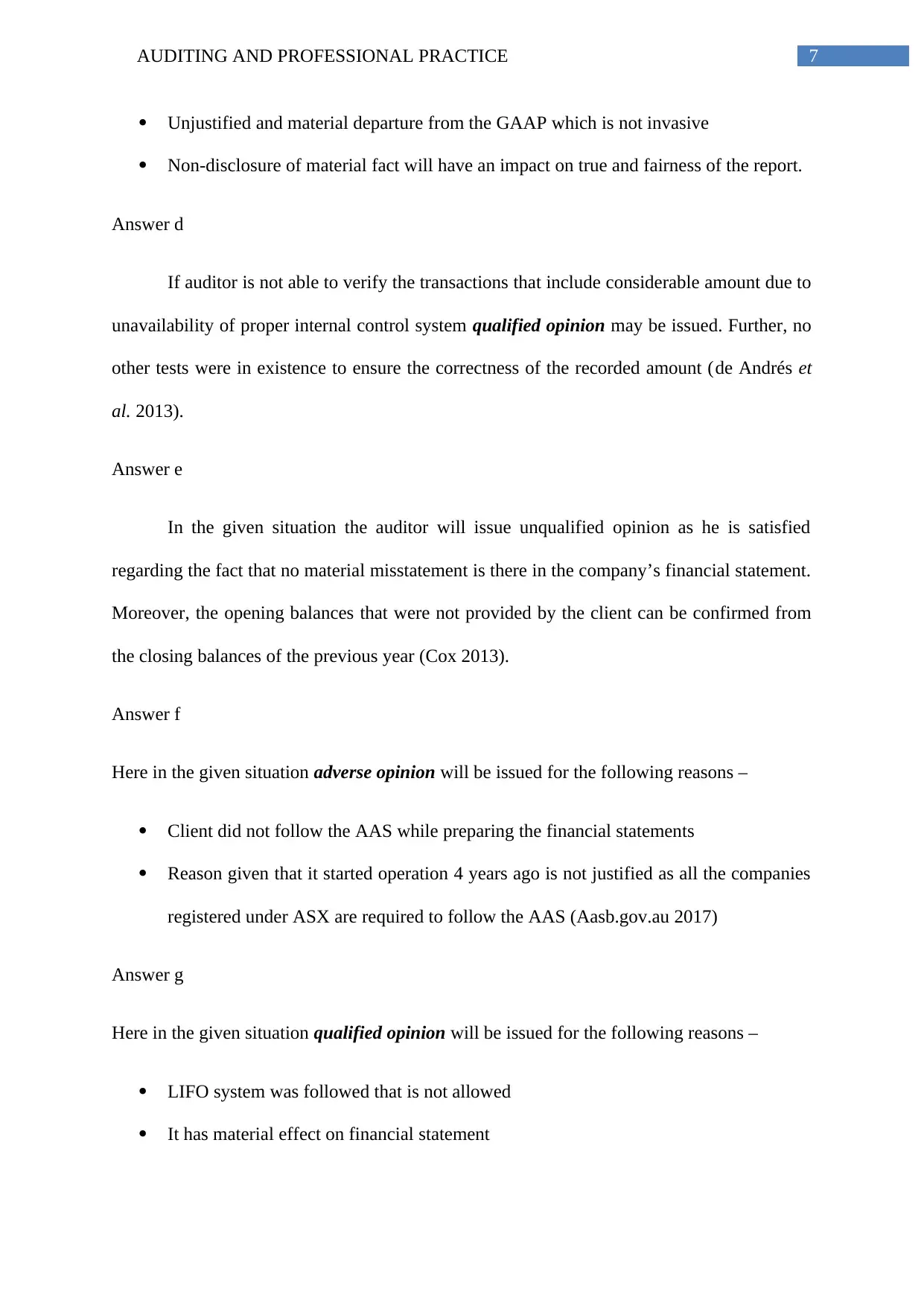
7AUDITING AND PROFESSIONAL PRACTICE
Unjustified and material departure from the GAAP which is not invasive
Non-disclosure of material fact will have an impact on true and fairness of the report.
Answer d
If auditor is not able to verify the transactions that include considerable amount due to
unavailability of proper internal control system qualified opinion may be issued. Further, no
other tests were in existence to ensure the correctness of the recorded amount (de Andrés et
al. 2013).
Answer e
In the given situation the auditor will issue unqualified opinion as he is satisfied
regarding the fact that no material misstatement is there in the company’s financial statement.
Moreover, the opening balances that were not provided by the client can be confirmed from
the closing balances of the previous year (Cox 2013).
Answer f
Here in the given situation adverse opinion will be issued for the following reasons –
Client did not follow the AAS while preparing the financial statements
Reason given that it started operation 4 years ago is not justified as all the companies
registered under ASX are required to follow the AAS (Aasb.gov.au 2017)
Answer g
Here in the given situation qualified opinion will be issued for the following reasons –
LIFO system was followed that is not allowed
It has material effect on financial statement
Unjustified and material departure from the GAAP which is not invasive
Non-disclosure of material fact will have an impact on true and fairness of the report.
Answer d
If auditor is not able to verify the transactions that include considerable amount due to
unavailability of proper internal control system qualified opinion may be issued. Further, no
other tests were in existence to ensure the correctness of the recorded amount (de Andrés et
al. 2013).
Answer e
In the given situation the auditor will issue unqualified opinion as he is satisfied
regarding the fact that no material misstatement is there in the company’s financial statement.
Moreover, the opening balances that were not provided by the client can be confirmed from
the closing balances of the previous year (Cox 2013).
Answer f
Here in the given situation adverse opinion will be issued for the following reasons –
Client did not follow the AAS while preparing the financial statements
Reason given that it started operation 4 years ago is not justified as all the companies
registered under ASX are required to follow the AAS (Aasb.gov.au 2017)
Answer g
Here in the given situation qualified opinion will be issued for the following reasons –
LIFO system was followed that is not allowed
It has material effect on financial statement
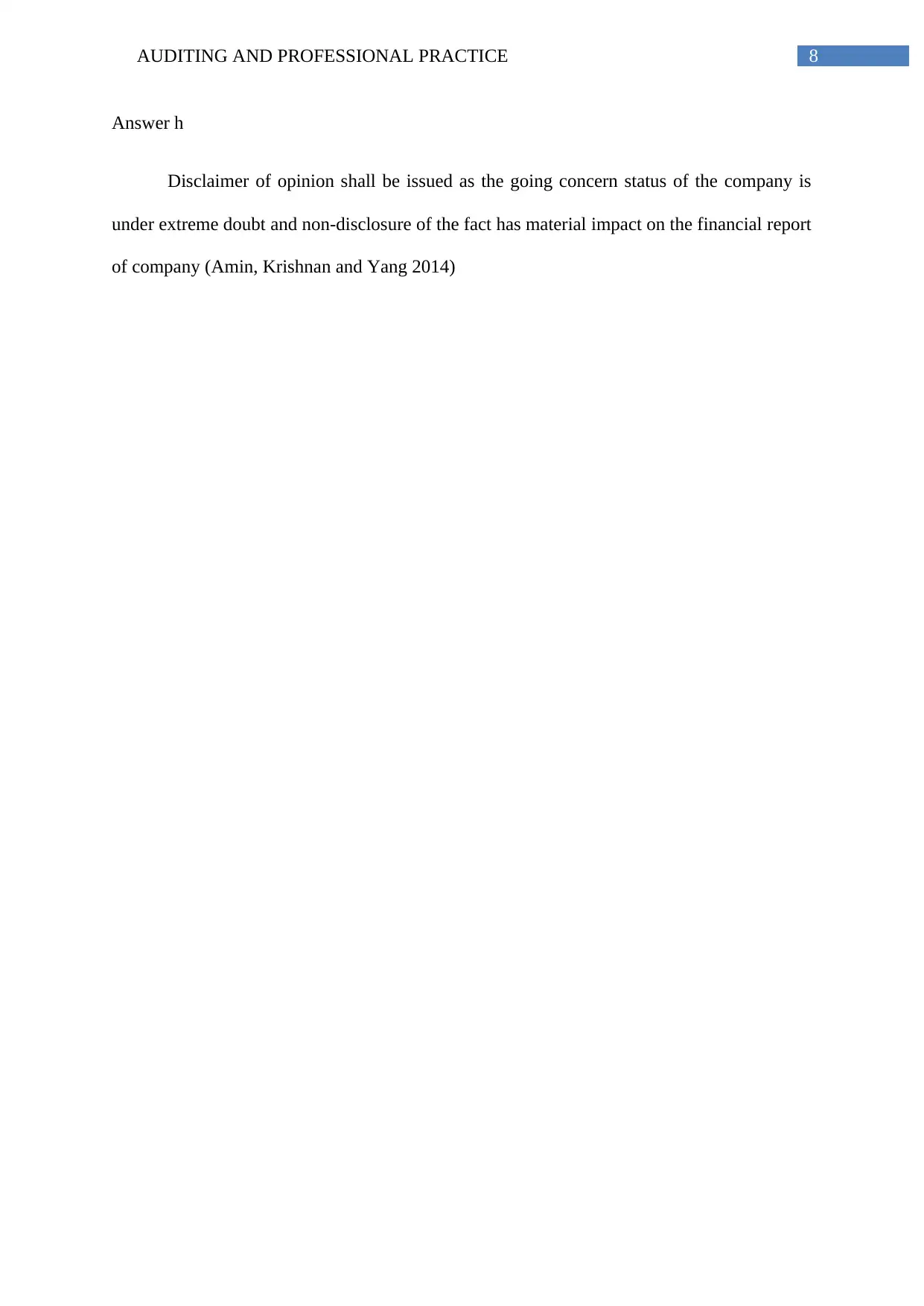
8AUDITING AND PROFESSIONAL PRACTICE
Answer h
Disclaimer of opinion shall be issued as the going concern status of the company is
under extreme doubt and non-disclosure of the fact has material impact on the financial report
of company (Amin, Krishnan and Yang 2014)
Answer h
Disclaimer of opinion shall be issued as the going concern status of the company is
under extreme doubt and non-disclosure of the fact has material impact on the financial report
of company (Amin, Krishnan and Yang 2014)
⊘ This is a preview!⊘
Do you want full access?
Subscribe today to unlock all pages.

Trusted by 1+ million students worldwide
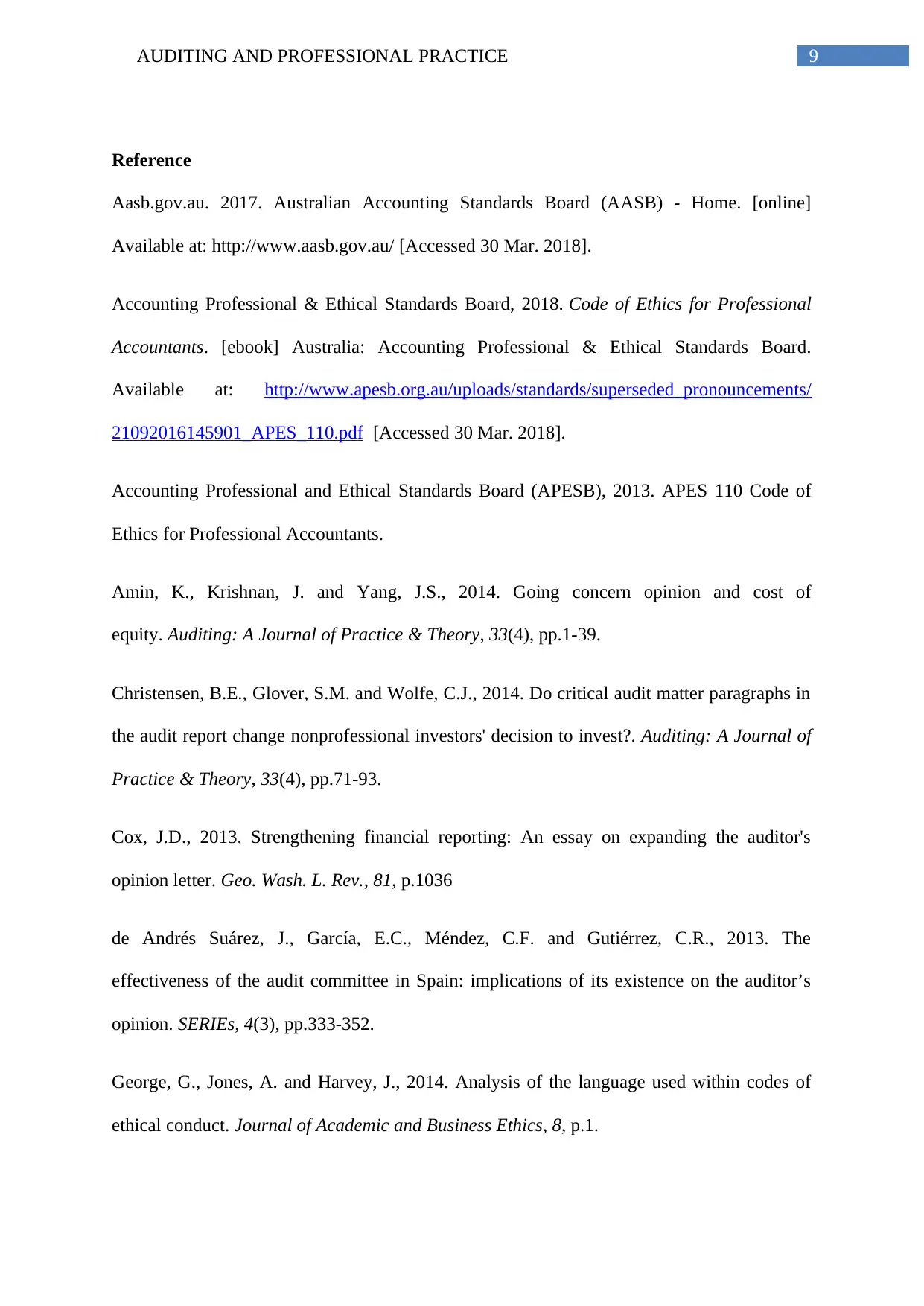
9AUDITING AND PROFESSIONAL PRACTICE
Reference
Aasb.gov.au. 2017. Australian Accounting Standards Board (AASB) - Home. [online]
Available at: http://www.aasb.gov.au/ [Accessed 30 Mar. 2018].
Accounting Professional & Ethical Standards Board, 2018. Code of Ethics for Professional
Accountants. [ebook] Australia: Accounting Professional & Ethical Standards Board.
Available at: http://www.apesb.org.au/uploads/standards/superseded_pronouncements/
21092016145901_APES_110.pdf [Accessed 30 Mar. 2018].
Accounting Professional and Ethical Standards Board (APESB), 2013. APES 110 Code of
Ethics for Professional Accountants.
Amin, K., Krishnan, J. and Yang, J.S., 2014. Going concern opinion and cost of
equity. Auditing: A Journal of Practice & Theory, 33(4), pp.1-39.
Christensen, B.E., Glover, S.M. and Wolfe, C.J., 2014. Do critical audit matter paragraphs in
the audit report change nonprofessional investors' decision to invest?. Auditing: A Journal of
Practice & Theory, 33(4), pp.71-93.
Cox, J.D., 2013. Strengthening financial reporting: An essay on expanding the auditor's
opinion letter. Geo. Wash. L. Rev., 81, p.1036
de Andrés Suárez, J., García, E.C., Méndez, C.F. and Gutiérrez, C.R., 2013. The
effectiveness of the audit committee in Spain: implications of its existence on the auditor’s
opinion. SERIEs, 4(3), pp.333-352.
George, G., Jones, A. and Harvey, J., 2014. Analysis of the language used within codes of
ethical conduct. Journal of Academic and Business Ethics, 8, p.1.
Reference
Aasb.gov.au. 2017. Australian Accounting Standards Board (AASB) - Home. [online]
Available at: http://www.aasb.gov.au/ [Accessed 30 Mar. 2018].
Accounting Professional & Ethical Standards Board, 2018. Code of Ethics for Professional
Accountants. [ebook] Australia: Accounting Professional & Ethical Standards Board.
Available at: http://www.apesb.org.au/uploads/standards/superseded_pronouncements/
21092016145901_APES_110.pdf [Accessed 30 Mar. 2018].
Accounting Professional and Ethical Standards Board (APESB), 2013. APES 110 Code of
Ethics for Professional Accountants.
Amin, K., Krishnan, J. and Yang, J.S., 2014. Going concern opinion and cost of
equity. Auditing: A Journal of Practice & Theory, 33(4), pp.1-39.
Christensen, B.E., Glover, S.M. and Wolfe, C.J., 2014. Do critical audit matter paragraphs in
the audit report change nonprofessional investors' decision to invest?. Auditing: A Journal of
Practice & Theory, 33(4), pp.71-93.
Cox, J.D., 2013. Strengthening financial reporting: An essay on expanding the auditor's
opinion letter. Geo. Wash. L. Rev., 81, p.1036
de Andrés Suárez, J., García, E.C., Méndez, C.F. and Gutiérrez, C.R., 2013. The
effectiveness of the audit committee in Spain: implications of its existence on the auditor’s
opinion. SERIEs, 4(3), pp.333-352.
George, G., Jones, A. and Harvey, J., 2014. Analysis of the language used within codes of
ethical conduct. Journal of Academic and Business Ethics, 8, p.1.
Paraphrase This Document
Need a fresh take? Get an instant paraphrase of this document with our AI Paraphraser
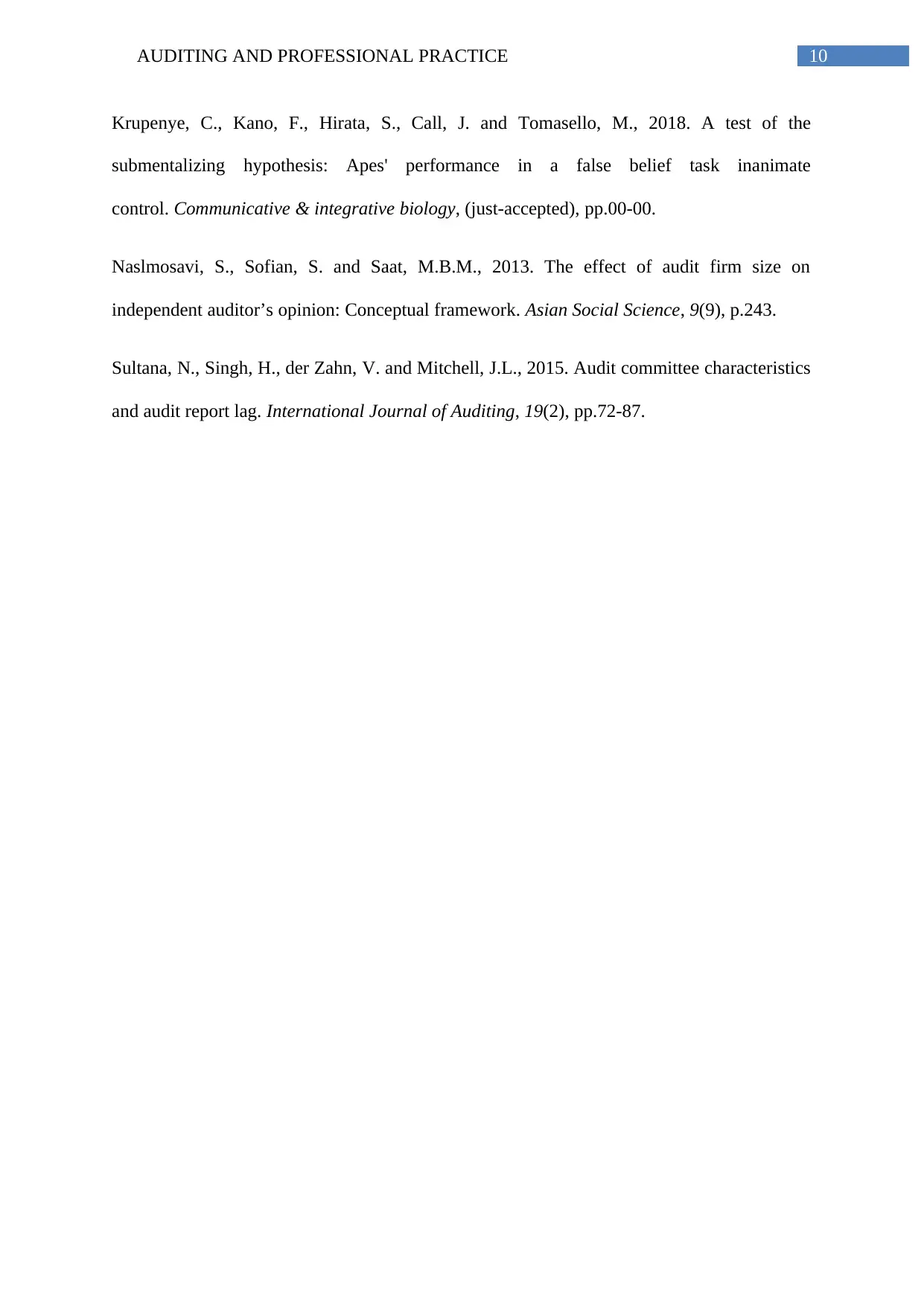
10AUDITING AND PROFESSIONAL PRACTICE
Krupenye, C., Kano, F., Hirata, S., Call, J. and Tomasello, M., 2018. A test of the
submentalizing hypothesis: Apes' performance in a false belief task inanimate
control. Communicative & integrative biology, (just-accepted), pp.00-00.
Naslmosavi, S., Sofian, S. and Saat, M.B.M., 2013. The effect of audit firm size on
independent auditor’s opinion: Conceptual framework. Asian Social Science, 9(9), p.243.
Sultana, N., Singh, H., der Zahn, V. and Mitchell, J.L., 2015. Audit committee characteristics
and audit report lag. International Journal of Auditing, 19(2), pp.72-87.
Krupenye, C., Kano, F., Hirata, S., Call, J. and Tomasello, M., 2018. A test of the
submentalizing hypothesis: Apes' performance in a false belief task inanimate
control. Communicative & integrative biology, (just-accepted), pp.00-00.
Naslmosavi, S., Sofian, S. and Saat, M.B.M., 2013. The effect of audit firm size on
independent auditor’s opinion: Conceptual framework. Asian Social Science, 9(9), p.243.
Sultana, N., Singh, H., der Zahn, V. and Mitchell, J.L., 2015. Audit committee characteristics
and audit report lag. International Journal of Auditing, 19(2), pp.72-87.
1 out of 11
Related Documents
Your All-in-One AI-Powered Toolkit for Academic Success.
+13062052269
info@desklib.com
Available 24*7 on WhatsApp / Email
![[object Object]](/_next/static/media/star-bottom.7253800d.svg)
Unlock your academic potential
Copyright © 2020–2026 A2Z Services. All Rights Reserved. Developed and managed by ZUCOL.




